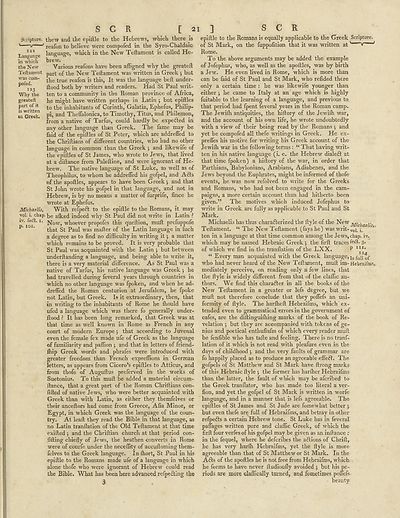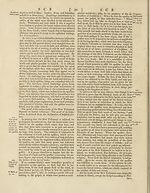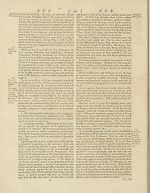Encyclopaedia Britannica, or, a Dictionary of arts, sciences, and miscellaneous literature : enlarged and improved. Illustrated with nearly six hundred engravings > Volume 19, Scripture-SUG
(27) Page 21
Download files
Complete book:
Individual page:
Thumbnail gallery: Grid view | List view

Scripture.
12a
Language
in which
the New
Teftament
was com-
pofed.
123
Why the
greateft
part of it
is written
tn Greek.
Michaelis,
vol. i. chap
iv. fedt. x.
p. xoi.
SCR [ 2
thew and the epiiile to the Hebrews, which there is
reafon to believe were compofed in the Syro-Chaldaic
language, which in the New Teftament is called He¬
brew.
Various reafons have been afligned why the greateft
part of the New Teftament was written in Greek •, but
the true reafon is this, It was the language beft under-
ftood both by writers and readers. Had St Paul writ¬
ten to a community in the Roman province of Africa,
he might have written perhaps in Latin j but epiftles
to the inhabitants of Corinth, Galatia, Ephefus, Philip¬
pi, and Theffalonica, to Timothy, Titus, and Philemon,
from a native of Tarfus, could hardly be expe&ed in
any other language than Greek. The fame may be
faid of the epiftles of St Peter, which are addreffed to
the Chriftians of different countries, who had no other
language in common than the Greek j and likewife of
the epiftles of St James, who wrote to Jews, that lived
at a diftance from Paleftine, and were ignorant of He¬
brew. The native language of St Luke, as well as of
Theophilus, to whom he addrefled his gofpel, and Afts
of the apoftles, appears to have been Greek; and that
St John wrote his gofpel in that language, and not in
Hebrew, is by no means a matter of furprife, fince he
wrote at Ephefus.
With refpeft to the epiftle to the Romans, it may
be afked indeed why St Paul did not write in Latin ?
Now, whoever propofes this queftion, muft prefuppofe
that St Paul was mafter of the Latin language in fuch
a degree as to find no difficulty in writing it j a matter
which remains to be proved. It is very probable that
St Paul was acquainted with the Latin •, but between
underftanding a language, and being able to write it,
there is a very material difference. As St Paul was a
native of Tarfus, his native language was Greek j he
had travelled during feveral years through countries in
which no other language was fpoken, and when he ad¬
dreffed the Roman centurion at Jerufalem, he fpoke
not Latin, but Greek. Is it extraordinary, then, that
in writing to the inhabitants of Rome he fliould have
ufed a language which was there fo generally under-
ftood ? It has been long remarked, that Greek was at
that time as well known in Rome as French in any
court of modern Europe j that according to Juvenal
even the female fex made ufe of Greek as the language
of familiarity and paffion j and that in letters of friend-
Ihip Greek words and phrafes were introduced with
greater freedom than French expreffions in German
letters, as appears from CicenPs epiftles to Atticus, and
from thofe of Auguftus preferved in the works of
Suetonius. To this muft be added a material circum-
ftance, that a great part of the Roman Chriftians con-
fifted of native Jews, who were better acquainted with
Greek than with Latin, as either they themfelves or
their anceftors had come from Greece, Afia Minor, or
Egypt, in which Greek was the language of the coun¬
try. At leaft they read the Bible in that language, as
no Latin tranflation of the Old Teftament at that time
exifted j and the Chriftian church at that period con-
lifting chiefly of Jews, the heathen converts in Rome
were of courfe under the neceffity of accuftoming them¬
felves to the Greek language. In ffiort, St Paul in his
epiftle to the Romans made ufe of a language in which
alone thofe who were ignorant of Hebrew could read
the Bible. What has been here advanced refpe&ing the
3
1 ] SCR
epiftle to the Romans is equally applicable to the Greek Scripture,
of St Mark, on the fuppofition that it was written atv—'
Rome.
To the above arguments may be added the example
of Jofephus, who, as well as the apoftles, was by birth
a Jew\ He even lived in Rome, which is more than
can be faid of St Paul and St Mark, who refided there
only a certain time : he was likewife younger than
either j he came to Italy at an age which is highly
fuitable to the learning of a language, and previous to
that period had fpent feveral years in the Roman camp.
The Jewifh antiquities, the hiftory of the Jewiffi war,
and the account of his own life, he wrote undoubtedly
with a view of their being read by the Romans ; and
yet he compofed all thefe writings in Greek. He ex-
preffes his motive for writing his Greek account of the
Jewifh war in the following terms : “ That having writ¬
ten in his native language (i. e. the Hebrew dialeft at
that time fpoken) a hiftory of the war, in order that
Parthians, Babylonians, Arabians, Adiabenes, and the
Jews beyond the Euphrates, might be informed of thofe
events, he was now refolved to write for the Greeks
and Romans, who had not been engaged in the cam¬
paigns, a more certain account than had hitherto been
given.” The motives which induced Jofephus to
write in Greek are fully as applicable to St Paul and St
Mark.
Michaelis has thus chara<5lerized the ftyle of the New , ..
Teftament. “ The New Teftament (fays he) was writ-voi ‘S>‘
ten in a language at that time common among the Jews, chap. iv.
which may be named Hebraic Greek ; the firft traces 3*
of which we find in the tranflation of the LXX. P 1I1*
“ Every man acquainted with the Greek language, js fuu2Qt*
who had never heard of the New Teftament, muft im-Hebrait'ms,
mediately perceive, on reading only a few lines, that
the ftyle is widely different from that of the claffic au¬
thors. We find this charafler in all the books of the
New Teftament in a greater or lefs degree, but we
muft not therefore conclude that they poffefs an uni¬
formity of ftyle. The harfheft Hebraifms, which ex¬
tended even to grammatical errors in the government of
cafes, are the diftinguiffiing marks of the book of Re¬
velation j but they are accompanied with tokens of ge¬
nius and poetical enthufiafm of which every reader muft:
be fenfible who has tafte and feeling. There is no tranf¬
lation of it which is not read with pleafure even in the
days of childhood y and the very faults of grammar are
fo happily placed as to produce an agreeable effeft. The
gofpels of St Matthew and St Mark have ftrong marks
of this Hebraic ftyle $ the former has harfher Hebraifms
than the latter, the fault of which may be afcribed to
the Greek tranflator, who has made too literal a ver-
fion, and yet the gofpel of St Mark is written in worfe
language, and in a manner that is lefs agreeable. The
epiftles of St James and St Jude are fomewhat better y
but even thefe are full of Hebraifms, and betray in other
refpe£!s a certain Hebrew tone. St Luke has in feveral
paffages rvritten pure and claffic Greek, of which the
firft four verfesof his gofpel may be given as an inftance :
in the fequel, where he defcribes the aflions of Chrift,
he has very harfti Hebraifms, yet the ftyle is more
agreeable than that of St Matthew or St Mark. In the
A<fts of the apoftles he is not free from Hebraifms, which
he feems to have never ftudiouffy avoided ; but his pe¬
riods are more claffically turned, and fometimes poffefs
beauty
12a
Language
in which
the New
Teftament
was com-
pofed.
123
Why the
greateft
part of it
is written
tn Greek.
Michaelis,
vol. i. chap
iv. fedt. x.
p. xoi.
SCR [ 2
thew and the epiiile to the Hebrews, which there is
reafon to believe were compofed in the Syro-Chaldaic
language, which in the New Teftament is called He¬
brew.
Various reafons have been afligned why the greateft
part of the New Teftament was written in Greek •, but
the true reafon is this, It was the language beft under-
ftood both by writers and readers. Had St Paul writ¬
ten to a community in the Roman province of Africa,
he might have written perhaps in Latin j but epiftles
to the inhabitants of Corinth, Galatia, Ephefus, Philip¬
pi, and Theffalonica, to Timothy, Titus, and Philemon,
from a native of Tarfus, could hardly be expe&ed in
any other language than Greek. The fame may be
faid of the epiftles of St Peter, which are addreffed to
the Chriftians of different countries, who had no other
language in common than the Greek j and likewife of
the epiftles of St James, who wrote to Jews, that lived
at a diftance from Paleftine, and were ignorant of He¬
brew. The native language of St Luke, as well as of
Theophilus, to whom he addrefled his gofpel, and Afts
of the apoftles, appears to have been Greek; and that
St John wrote his gofpel in that language, and not in
Hebrew, is by no means a matter of furprife, fince he
wrote at Ephefus.
With refpeft to the epiftle to the Romans, it may
be afked indeed why St Paul did not write in Latin ?
Now, whoever propofes this queftion, muft prefuppofe
that St Paul was mafter of the Latin language in fuch
a degree as to find no difficulty in writing it j a matter
which remains to be proved. It is very probable that
St Paul was acquainted with the Latin •, but between
underftanding a language, and being able to write it,
there is a very material difference. As St Paul was a
native of Tarfus, his native language was Greek j he
had travelled during feveral years through countries in
which no other language was fpoken, and when he ad¬
dreffed the Roman centurion at Jerufalem, he fpoke
not Latin, but Greek. Is it extraordinary, then, that
in writing to the inhabitants of Rome he fliould have
ufed a language which was there fo generally under-
ftood ? It has been long remarked, that Greek was at
that time as well known in Rome as French in any
court of modern Europe j that according to Juvenal
even the female fex made ufe of Greek as the language
of familiarity and paffion j and that in letters of friend-
Ihip Greek words and phrafes were introduced with
greater freedom than French expreffions in German
letters, as appears from CicenPs epiftles to Atticus, and
from thofe of Auguftus preferved in the works of
Suetonius. To this muft be added a material circum-
ftance, that a great part of the Roman Chriftians con-
fifted of native Jews, who were better acquainted with
Greek than with Latin, as either they themfelves or
their anceftors had come from Greece, Afia Minor, or
Egypt, in which Greek was the language of the coun¬
try. At leaft they read the Bible in that language, as
no Latin tranflation of the Old Teftament at that time
exifted j and the Chriftian church at that period con-
lifting chiefly of Jews, the heathen converts in Rome
were of courfe under the neceffity of accuftoming them¬
felves to the Greek language. In ffiort, St Paul in his
epiftle to the Romans made ufe of a language in which
alone thofe who were ignorant of Hebrew could read
the Bible. What has been here advanced refpe&ing the
3
1 ] SCR
epiftle to the Romans is equally applicable to the Greek Scripture,
of St Mark, on the fuppofition that it was written atv—'
Rome.
To the above arguments may be added the example
of Jofephus, who, as well as the apoftles, was by birth
a Jew\ He even lived in Rome, which is more than
can be faid of St Paul and St Mark, who refided there
only a certain time : he was likewife younger than
either j he came to Italy at an age which is highly
fuitable to the learning of a language, and previous to
that period had fpent feveral years in the Roman camp.
The Jewifh antiquities, the hiftory of the Jewiffi war,
and the account of his own life, he wrote undoubtedly
with a view of their being read by the Romans ; and
yet he compofed all thefe writings in Greek. He ex-
preffes his motive for writing his Greek account of the
Jewifh war in the following terms : “ That having writ¬
ten in his native language (i. e. the Hebrew dialeft at
that time fpoken) a hiftory of the war, in order that
Parthians, Babylonians, Arabians, Adiabenes, and the
Jews beyond the Euphrates, might be informed of thofe
events, he was now refolved to write for the Greeks
and Romans, who had not been engaged in the cam¬
paigns, a more certain account than had hitherto been
given.” The motives which induced Jofephus to
write in Greek are fully as applicable to St Paul and St
Mark.
Michaelis has thus chara<5lerized the ftyle of the New , ..
Teftament. “ The New Teftament (fays he) was writ-voi ‘S>‘
ten in a language at that time common among the Jews, chap. iv.
which may be named Hebraic Greek ; the firft traces 3*
of which we find in the tranflation of the LXX. P 1I1*
“ Every man acquainted with the Greek language, js fuu2Qt*
who had never heard of the New Teftament, muft im-Hebrait'ms,
mediately perceive, on reading only a few lines, that
the ftyle is widely different from that of the claffic au¬
thors. We find this charafler in all the books of the
New Teftament in a greater or lefs degree, but we
muft not therefore conclude that they poffefs an uni¬
formity of ftyle. The harfheft Hebraifms, which ex¬
tended even to grammatical errors in the government of
cafes, are the diftinguiffiing marks of the book of Re¬
velation j but they are accompanied with tokens of ge¬
nius and poetical enthufiafm of which every reader muft:
be fenfible who has tafte and feeling. There is no tranf¬
lation of it which is not read with pleafure even in the
days of childhood y and the very faults of grammar are
fo happily placed as to produce an agreeable effeft. The
gofpels of St Matthew and St Mark have ftrong marks
of this Hebraic ftyle $ the former has harfher Hebraifms
than the latter, the fault of which may be afcribed to
the Greek tranflator, who has made too literal a ver-
fion, and yet the gofpel of St Mark is written in worfe
language, and in a manner that is lefs agreeable. The
epiftles of St James and St Jude are fomewhat better y
but even thefe are full of Hebraifms, and betray in other
refpe£!s a certain Hebrew tone. St Luke has in feveral
paffages rvritten pure and claffic Greek, of which the
firft four verfesof his gofpel may be given as an inftance :
in the fequel, where he defcribes the aflions of Chrift,
he has very harfti Hebraifms, yet the ftyle is more
agreeable than that of St Matthew or St Mark. In the
A<fts of the apoftles he is not free from Hebraifms, which
he feems to have never ftudiouffy avoided ; but his pe¬
riods are more claffically turned, and fometimes poffefs
beauty
Set display mode to:
![]() Universal Viewer |
Universal Viewer | ![]() Mirador |
Large image | Transcription
Mirador |
Large image | Transcription
Images and transcriptions on this page, including medium image downloads, may be used under the Creative Commons Attribution 4.0 International Licence unless otherwise stated. ![]()
| Permanent URL | https://digital.nls.uk/192695633 |
|---|
| Attribution and copyright: |
|
|---|
| Description | Ten editions of 'Encyclopaedia Britannica', issued from 1768-1903, in 231 volumes. Originally issued in 100 weekly parts (3 volumes) between 1768 and 1771 by publishers: Colin Macfarquhar and Andrew Bell (Edinburgh); editor: William Smellie: engraver: Andrew Bell. Expanded editions in the 19th century featured more volumes and contributions from leading experts in their fields. Managed and published in Edinburgh up to the 9th edition (25 volumes, from 1875-1889); the 10th edition (1902-1903) re-issued the 9th edition, with 11 supplementary volumes. |
|---|---|
| Additional NLS resources: |
|

